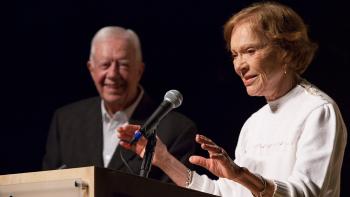The U.S. is grappling with a gap of more than 3.8 million homes. Housing instability has real and lasting impacts on people and the communities where they live.
It is a leading cause of labor shortages and unemployment, school absenteeism and poor health outcomes, both mental and physical.
While Habitat for Humanity continues to build homes, a beloved model of service, we know we cannot build enough homes. The need is simply too great.
Because of the incredible scale of the issues, Habitat launched a home affordability advocacy campaign, Cost of Home. Former U.S. President Jimmy Carter and former first lady Rosalynn Carter served as honoree campaign cabinet members.
The campaign has cultivated, inspired and educated housing advocates to influence policy and re-shape systems that help to increase access to affordable homes for millions of Americans.
Entering the fifth and final year of the campaign, local and state Habitat organizations have advocated for more than 300 policy changes and unlocked over $20 billion in government funds for home affordability, resulting in an estimated 6.6 million people gaining increased access to safe, affordable homes.
As Habitat for Humanity’s most famous volunteer and one of our inaugural Habitat Humanitarians, former U.S. President Jimmy Carter often urged everyone from world leaders to the general public to include adequate housing as one of the fundamental elements needed to live with dignity and thrive.
“To have a decent place to live,” he said, “is to have a chance to live in peace and to have adequate health care and adequate education, so you can take advantage of your talents.”
Throughout his tenure as head of state and in the years following, President Carter’s focus on advancing the central components of peace, health and human rights never wavered. He and former first lady Rosalynn Carter partnered with Habitat for more than 35 years, tenaciously advocating for the importance of affordable and adequate housing and helping families to build and improve homes around the world.
Inspired by their example and impact, we continue our global work, carrying out our beloved model of service and working to change systems and policies to ensure that even more people can access adequate shelter they can afford.


